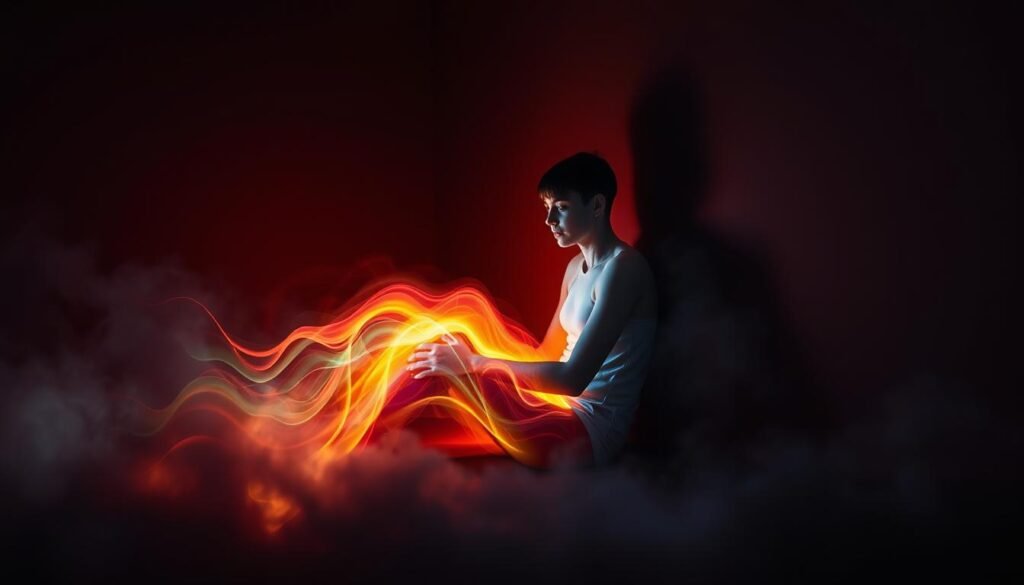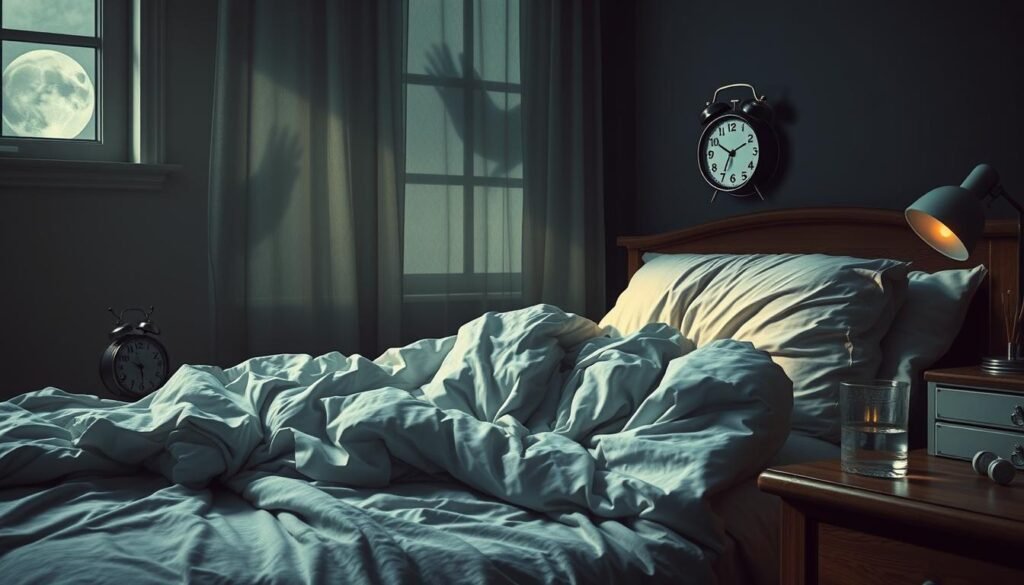Did you know about 40 million adults in the United States struggle with anxiety disorders yearly? This shows a big issue affecting energy and overall health. Many people feel stuck in a cycle of anxiety and tiredness, leading to feeling exhausted. The link between anxiety and low energy is deeper than most think, making many look for solutions. This article aims to show how anxiety impacts energy and how to get back your vitality.
Understanding the effects of anxiety on physical and mental health is crucial. It helps individuals start recovering. We will explore everyday struggles and how anxiety changes energy levels. Also, we’ll share how to reduce the tiredness it brings. You’ll learn methods and insights to change how you feel and live with more energy. For more on how anxiety leads to fatigue, check out this resource.
Key Takeaways
- Anxiety affects nearly 40 million adults in the U.S., significantly worsening feelings of fatigue.
- The mind-body connection shows how stress from anxiety can use up physical energy.
- Learning relaxation methods can fight off the tiring effects of anxiety.
- It’s key to understand how anxiety messes up sleep, to get back energy.
- Finding professional help is a must to deal with anxiety-related tiredness well.
Understanding Anxiety and Its Impact on Energy
Anxiety impacts our mental and physical health greatly. It can make us understand how it drains our energy. This condition sets off our “fight-or-flight” response. This means our body gets ready for danger all the time. When this happens too much, we become very tired and lose energy.
When people have anxiety, they worry a lot. This worry makes them feel very tired mentally and emotionally. They become too tired to enjoy things they used to like. There are also physical signs like headaches and muscle tension. These make concentrating hard.
Those with anxiety often can’t sleep well. Stress hormones keep them awake. This makes the problem of tiredness even worse. Experts say we should sleep for 7 to 9 hours to feel better. But, getting enough sleep is hard for people with anxiety.
There is strong proof that anxiety and energy levels are connected. Regular exercise can help protect against anxiety. Even one yoga class can help us relax. Relaxation techniques and cognitive behavioral therapy (CBT) can help. They teach us to change bad thought patterns. Medications like SSRIs and SNRIs are also effective. They treat the symptoms and help bring back energy.
| Symptoms | Description |
|---|---|
| Chronic Fatigue | Ongoing tiredness without relief that affects daily functioning. |
| Mental Exhaustion | Cognitive dullness and lack of concentration due to constant worry. |
| Physical Symptoms | Headaches, weakness, and concentration difficulties arising from anxiety. |
| Sleep Disorders | Interrupted sleep patterns leading to insufficient rest and recovery. |
| Reduced Energy | Lack of motivation and interest in activities that once brought joy. |
How Anxiety Affects Physical Health
Anxiety greatly affects our health, leading to many problems that reduce our well-being. Muscle tension is a common issue, causing discomfort and tiredness. People with anxiety often have a fast heartbeat, palpitations, and chest pain. These symptoms can make you feel extremely tired and stressed.
Without treatment, anxiety may cause serious health problems later. High blood pressure and heart disease are more common in those with anxiety. Anxiety can also weaken your immune system, making you get sick more often. It makes you feel weak and impacts your daily life.
Studies show that anxiety can lead to stomach problems, like irritable bowel syndrome (IBS), after an infection. These health concerns from anxiety make treating it harder and harm your everyday life.
Moreover, rapid, shallow breathing is a problem, especially for those already dealing with asthma or COPD. People with anxiety often feel stuck in a cycle of tiredness and discomfort. They find it tough to get their energy and happiness back.

The Psychological Toll: Mental Fatigue Due to Anxiety
Anxiety deeply affects us by causing psychological effects. It leads to mental fatigue by making us constantly worry. These thoughts tire our minds, making it hard to focus or be productive. People facing this issue often feel very tired and helpless. Studies have found that too much worrying overloads our mind. This mental fatigue weakens our memory, concentration, and decision-making.
Research says anxiety makes our body release stress hormones like cortisol and adrenaline. These hormones prepare us for fight or flight but also upset our chemical balance, creating fatigue. Our nervous system becomes too active, leading to fast heartbeats and tense muscles. This uses up more energy.
Feeling anxious and tired goes hand in hand, creating a harmful cycle. Constant mental activity causes brain fog, making it hard to stay focused. Anxiety might also make people avoid social situations, which could have refreshed them. Thus, feeling tired from anxiety is both a physical and emotional issue, draining us deeply.
The link between anxiety and mental tiredness is complex. But, following proven methods can help manage this fatigue. For more tips on easing mental exhaustion, check out ways to combat mental fatigue.
Identifying the Impact of Anxiety on Energy Levels
Anxiety can really lower your energy and show up in many ways in everyday life. People with anxiety often feel very tired. They can be irritable and have trouble focusing. Understanding how anxiety affects energy is critical. It helps us manage our energy better.
Symptoms of Anxiety Manifesting as Low Energy
Those with anxiety might feel caught in a cycle of tiredness. Here are some common signs:
- Irritability: Quick changes in mood and easily frustrated can drain energy.
- Difficulty concentrating: This makes it hard to get things done, making you feel more tired.
- Constant tiredness: Even with enough rest, someone can still feel worn out, showing how deep anxiety can affect energy.
Connecting Anxiety and Chronic Fatigue
There’s a big link between anxiety and long-lasting fatigue. This situation can be tough for those dealing with it. Anxiety over time can lead to ongoing tiredness. This affects both mental and physical health. Stress from anxiety makes the body respond as if it’s wiped out, even without doing physical work. For more on this topic, check out the info at Healthline.
The Role of Sleep Disruptions in Anxiety-Induced Fatigue
Anxiety disorders often lead to problems with sleep. This results in feeling more tired than usual. The cycle of poor sleep and anxiety is hard to break. Knowing how worry and body issues hurt sleep can help us deal with anxiety’s effect on tiredness.
Effects of Racing Thoughts on Sleep Quality
Racing thoughts at night make sleeping hard. This keeps the brain too active for rest. Studies show nearly half of adults with anxiety also face insomnia. These thoughts spoil sleep quality and add to daily tiredness.
Physical Symptoms Interfering with Rest
Anxiety brings physical issues that disrupt sleep. For example, muscle tension stops you from relaxing. Anxiety can make your heart beat fast or your breathing uneven, which also stops good sleep. Those with sleep apnea, a sleep trouble, are more likely to have anxiety issues. A 2013 study even found that not sleeping enough can make anxiety worse.

To lessen anxiety, it’s crucial to fix sleep problems. Therapies and a regular bedtime can help you sleep better. This breaks the cycle of anxiety and fatigue. Getting the right help is key to improving your sleep and wellbeing.
| Condition | Impact on Sleep | Prevalence in U.S. Adults |
|---|---|---|
| Anxiety Disorders | Significant sleep disruptions | 20% |
| Insomnia | Increased anxiety during stress | Common in anxiety sufferers |
| Obstructive Sleep Apnea | Higher rates of anxiety and panic | Higher impact than general population |
Improving sleep helps control anxiety better. Tackling sleep problems leads to a healthier, calmer life. To learn more, check out the research on how sleep and anxiety are.
Anxiety and Physical Energy: Why You Feel Exhausted
Anxiety drastically lowers your energy, making you often feel tired. This tired feeling comes from how our bodies react to stress. Our body gets ready to defend itself when we are anxious, which uses a lot of energy. If we are always in this defense mode, we end up feeling worn out every day.
The Fight-or-Flight Response Explained
Our bodies have a built-in way to deal with danger called the fight-or-flight response. When we’re scared or anxious, our bodies release adrenaline. This makes our heart beat faster and we breathe quicker. But if there’s no real danger and this keeps happening, it drains our energy. We end up feeling tired even when the stress is gone.
Muscle Tension: The Silent Energy Drain
Being anxious also makes our muscles tight. This tightness uses up energy, even though we’re not moving. This constant tension can lead to pain and makes us feel more tired. So, we might need to take breaks more often. It’s important to realize how this muscle tension tires us out to improve our health.

Strategies to Combat Anxiety and Reclaim Vitality
Finding ways to fight anxiety is key to getting our energy back. There are relaxation techniques that can be part of daily life. Mindfulness also helps a lot in controlling anxiety and improving our health. Here are some methods to lessen anxiety and bring back your energy.
Relaxation Techniques for Energy Restoration
Relaxation techniques play a big role in beating the tiredness anxiety brings. Some methods that work well include:
- Deep Breathing: Breathe in through the nose, hold it, then breathe out through the mouth. This helps lower stress and brings calmness.
- Progressive Muscle Relaxation: Tighten and then relax each muscle group, from your toes up to your head. It helps ease the tension that comes with anxiety.
- Meditation: Spending a few minutes a day on meditation can help you find peace and handle anxious thoughts better.
Mindfulness and Its Benefits for Anxiety Management
Mindfulness for energy is a strong way to deal with anxiety. It teaches us to stay in the moment, reducing overwhelming feelings. Here’s how it helps:
- Enhanced Focus: Mindfulness increases concentration, fighting off the mental fog that anxiety can cause.
- Improved Emotional Regulation: Those who practice mindfulness tend to manage their emotions better, which means less anxiety.
- Connection to the Body: Being aware of how our body feels helps notice anxiety signs early, allowing us to deal with them sooner.
Improving Sleep Hygiene to Reduce Anxiety Fatigue
Healthy sleep hygiene is crucial for lessening anxiety fatigue. A steady sleep routine betters sleep and supports well-being. It makes for a restful environment, good for relaxation.
Establishing a Relaxing Sleep Routine
Creating a calming routine before bed helps the body get ready for sleep. This can involve:
- Maintaining a consistent sleep schedule, going to bed and waking up at the same time daily.
- Creating a conducive sleep environment by keeping the room dark, quiet, and at a comfortable temperature.
- Limiting blue light exposure from devices at least an hour before bedtime to support melatonin production.
- Incorporating relaxation techniques, such as yoga or deep breathing, to ease stress before sleep.
Research shows that solid sleep hygiene boosts mental health. It has a big effect on cutting anxiety, depression, and stress.
Natural Supplements and Lifestyle Changes
Using natural supplements like melatonin can improve sleep. Also, adding exercise and cutting down on evening caffeine can better sleep quality.
The following table shows how well different steps work to improve sleep and lower anxiety:
| Intervention Type | Effect Size |
|---|---|
| Improving sleep hygiene | g+ = -0.53 |
| Mindfulness practice | g+ = -0.51 |
| Yoga for stress management | g+ = -0.42 |
| Regular aerobic exercise | g+ = -0.63 |
These anxiety fatigue solutions based on sleep hygiene can lead to better sleep and more energy. For more on diet and life tips, visit this resource.
Seeking Professional Help for Anxiety Management
Many people with anxiety could use professional help to manage it. This support can come from therapy or medication. Such treatments provide relief and can boost the energy levels affected by anxiety.
Cognitive-Behavioral Therapy as a Solution
Cognitive-behavioral therapy (CBT) is a top treatment for anxiety disorders. It changes negative thought patterns and behaviors that cause anxiety. CBT also gives people skills to cope better.
Adding meditation or yoga to CBT can improve well-being even more. For more on alternative therapies, check this guide at natural ways to manage fatigue and boost energy.
Medication Options: When to Consider Them
Medication can be key for some in managing anxiety. Options include antidepressants and anti-anxiety medications. The need for medication depends on how severe the symptoms are.
Always talk to a healthcare provider before starting any medication. Incorporating lifestyle changes like exercise and a healthy diet is also beneficial.
Conclusion
Knowing how anxiety impacts energy is key for anyone wanting more vitality in their life. Anxiety hits both your mind and body, making you very tired. This tiredness can mess with your work, love life, and happiness.
Start by spotting signs like feeling tired all the time. Then, tackle these issues head-on. Using relaxation and mindfulness can change your life. Getting better sleep and seeking professional help are big steps towards feeling more alive.
By tackling anxiety’s effects, you can live better and have more energy. The journey to beat anxiety’s challenges is doable and can make you stronger. With the right moves, anyone can get back their zest for life.